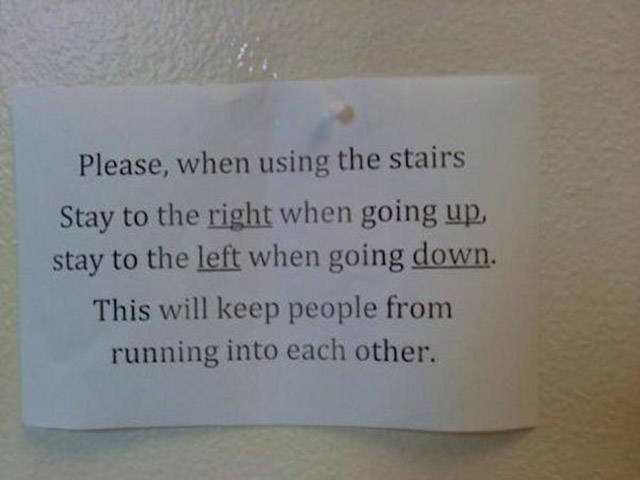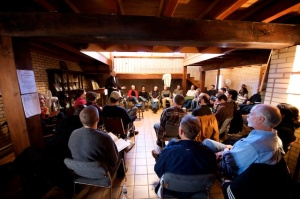TAT Forum
June 2019
Receive new-Forum notifications each month
Let your voice be heard
Enjoy the benefits of TAT membership
Become a TAT member
Help support TAT;
become a member today
|
As an Amazon Associate TAT earns from qualifying purchases made through links on our website. |

Convictions & Concerns
TAT members share their personal convictions and/or concerns
Placebo Buttons
A couple of months back, I came across an article on CNN called 'Illusion of control: Why the world is full of buttons that don't work'. The 'Illusion of control' piece of the title caught my attention.
The main thrust of the article is that many buttons typically used by us in our daily lives to speed things up, e.g. elevator buttons that close the doors faster and pedestrian cross walk buttons to change the light, are not actually hooked up, and so don't have any influence on the workings of the elevator or traffic light. However, they do provide an illusion of control to the person pushing them.
A Harvard psychologist, Ellen Langer, who is quoted in the article, says that the non-functioning buttons still serve a purpose. She pioneered a concept known as the "illusion of control" and said about the buttons, "They do have a psychological effect. Taking some action leads people to feel a sense of control over a situation, and that feels good, rather than just being a passive bystander. Doing something typically feels better than doing nothing."
The article goes on to explain the reasons for this, and aside from providing some illusory feeling of control, there are also some logical reasons, like safety, why these buttons don't always functionally work.
As mentioned at the start of this, the title of the article was what caught my attention, and it was interesting to read it. A big assumption, possibly the biggest one, on the path is that we are the 'doer', and by extension, we have free will and are making the decisions and calling the shots that influence the paths of our lives. As with the elevator and cross walk buttons, we all generally have a sense of control over our lives through our actions.
The question of free will has fascinated me for some time. I have read a lot of convincing material that seems to support the argument that I in fact do not have free will. I am never the first cause of anything and therefore do not really have any control over what is happening.
There even seems to be some valid scientific evidence that backs this up, too, although I have only heard of that second hand via people like Gary Weber. I haven't reviewed the research in any great depth myself. However, even without that, it seems that the argument can be supported to quite a convincing degree through reasoning alone.
Finally, there is my own personal experience. I am often carried away on a wave of random events which alter the trajectory of my best laid plans. Even daily in smaller ways, things happen which change my movement, thinking, decision making, etc. None of this, under objective review, I can claim any influence on or to.
On the other side of that coin though, also in my experience, there is a very strong feeling of 'me' being here. 'Me' as a separate entity, living 'my life' and having 'control and influence' on that life.
For example, a few days ago, I came home from work and had a list of tasks and things I wanted to get done in my house that evening. Work had been very busy of late and I had various other commitments during the weeks ahead, so I mapped this time to address these items.
I came home and after a 15 minute wind down with some tea, I was ready to move to start on my tasks, it felt good to be getting focused.
I wanted to do 30 minutes of exercise before I started my tasks proper, so this was first on the schedule. I walked upstairs to change into shorts, etc., and as I made my way to my bedroom, I spied a new pair of curtains in their packet lying on the bed in one of the other bedrooms, that I had bought the previous week. I recently installed new floors, painted, etc., in the bedrooms. To finish the work off, I had bought new curtains but hadn't put them all up; this one was still to do.
I had forgotten about these. They needed to be hung up, so I figured a short detour into the other bedroom to do this would take 5 minutes, and I could get back on point as planned.
In I went and opened the curtains from the pack and started to put them up. As I did so, I noticed a dirty yellow streak across one of them. They were damaged and so would have to be brought back. A quick mental scan of my busy weeks ahead, and I saw no window to bring them back … except at that exact time, even though it was rush hour and traffic would be busy.
To elaborate on the process, when I saw the damaged curtains, as mentioned, my mind looked ahead in time and saw no window in the next couple of weeks to change the curtains. My mind also wondered how long the receipt would allow me to bring the curtains back. Typically, this is a month, but there was a slight concern about this particular shop, as they told me when buying them, that I could not bring curtains back once they were taken out of the packet. (This struck me as odd when I bought them, and so it stuck in my mind.)
My mind did a real time probability analysis of sorts, that if I brought the curtains back now, closer to when I bought them, it was more likely they would believe me and not argue the point. If I left it too long, a couple of weeks to my next available window, they could potentially argue that if they were damaged, why did I leave it so long to bring them back. Although it was unlikely they would argue as long as the receipt window was good, if this happened, I could lose out on the €70 I paid for them. This was an element of fear and pain coming into the equation, fear of not being able to bring the curtains back, and the resulting pain of losing the money. Probability * Fear / Pain = wiser to deal with it now.
So as this was playing out, I moved from one position to another, based on live data (the damaged curtains), combined with my own make-up of being afraid of losing out on the money I paid for them, if I didn't take them back.
Next thing I know, I am in my car on my way to the store to replace the curtains. I got them replaced and eventually got back home after an hour, and then started into my tasks much later than planned.
The main point of this is that, throughout this, I had the conviction and feeling of being in control and making decisions as things changed. However, I had exactly the same conviction and feeling of control when I initially scheduled and committed to my first set of tasks to be done, before the damaged curtains diverted me out on a trip to replace them.
Looking objectively at this, things were just happening, and I was seeming to react based on the new information. That's how it felt. There seems to be me as the decision maker, but how much control did I really have in any of what happened? Probably not much, if any. I certainly had no influence on the state of the curtains. However, in some way, I am hitting a type of placebo button to give me the illusion of control, throughout.
So, regardless of all the regular personal experiences like that, any scientific evidence I have heard quoted and the philosophic and rational back and forth, that feeling of being a separate 'me' and having control, at least for now, trumps all the data contrary to it.
Of course, that is to be expected, as otherwise removing the identification with the self would likely be a much simpler affair indeed, and of course we all know that is not the case.
The belief in having control, etc. seems to me to be one of the key foundations of the separate self that we inquire into on the Path. It's one that the personal identity and story is built on. We are the captain of our ship.
This belief has interested me as it is a feeling belief close to the core of my, likely erroneous, identification as a person, and one I come face to face with a lot through inquiry.
In Robert Martin's Peace to the Wanderer, Richard Rose wrote in one of his letters:
It is possible that our thoughts and actions may be imposed on us: by mores, environment, heredity and desire. Or totally by a God. But neither of such is proven, and until we are absolutely sure that we are robots we should act as though we are free, and some of us will be impelled to seek for individuality and survival.
I had largely come to the same conclusion, so it was good to come across this from Rose. For the time being, until I either know for certain otherwise or the belief ends somehow, I will continue to live my life as if I have some element of control on it.
The CNN article got me to wondering, though, about what placebo buttons I might have in my life. For example, like the curtain experience, how many other metaphorical buttons do I regularly push in my life that give me the illusion of control? Maybe even ones I push that I know really don't work, but still I push them to get the control hit?
And following from that, what would happen if I truly discovered that my placebo buttons were actually everywhere, were ineffective and had no influence on the outcome of anything? Where would that leave 'me', my sense of who I believe I am, and 'my sense of control' on 'my life'?
And you reader, how would your sense of identity be challenged, if you discovered that you were in fact a passive bystander in your life? If your life was just one big placebo button?

~ Thanks to TAT member Colm H. for sharing this with us. Would you like to share your impressions with other TAT Forum readers? Please email your comments to the .


TAT Foundation News
It's all about "ladder work" – helping and being helped
|
"I appreciate writers who get to the point right away, then tell me a story to illustrate the point, then remind me again what the point was." – Shawn's opening sentence.
TAT Press's latest publication….
Awake at the Wheel: Norio Kushi's Highway Adventures and the Unmasking of the Phantom Self by Stephen Earle, with a Foreward by Norio Kushi, is available in paperback and in Kindle e-book format. Check out Shawn Nevins's interview of Norio on SpiritualTeachers.org podcasts.
|
April 5-7, 2019 (Claymont Great Barn)
* June 14-16, 2019 (Claymont Great Barn) *
August 16-18, 2019 (Claymont Mansion)
November 1-3, 2019 (Claymont Mansion)
 Join us for TAT's June 14-16, 2019 spiritual retreat. Details & registration.
Join us for TAT's June 14-16, 2019 spiritual retreat. Details & registration.
 The following video recordings of presentations from the April 2017 TAT meeting are available on YouTube:
The following video recordings of presentations from the April 2017 TAT meeting are available on YouTube:

 Richard Rose spent his life searching for the Truth, finding it, and teaching others to find their Way. Although not well known to the public, he touched the lives of thousands of spiritual seekers through his books and lectures and through personal contacts with local study groups that continue to work with his teachings today. Meet Richard Rose is a 34-minute audio recording of an audiovisual presentation by Michael Whitely at the August 2017 TAT meeting that explores the arc of Richard Rose's life as seeker, finder, family man, and teacher.
Richard Rose spent his life searching for the Truth, finding it, and teaching others to find their Way. Although not well known to the public, he touched the lives of thousands of spiritual seekers through his books and lectures and through personal contacts with local study groups that continue to work with his teachings today. Meet Richard Rose is a 34-minute audio recording of an audiovisual presentation by Michael Whitely at the August 2017 TAT meeting that explores the arc of Richard Rose's life as seeker, finder, family man, and teacher.
 Downloadable/rental versions of the Mister Rose video and of April TAT talks
Remembering Your True Desire (details).
Downloadable/rental versions of the Mister Rose video and of April TAT talks
Remembering Your True Desire (details).
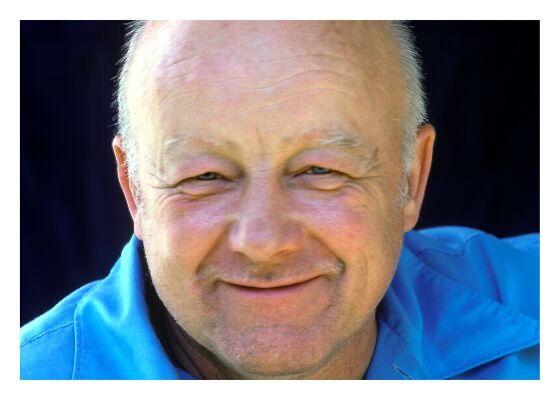
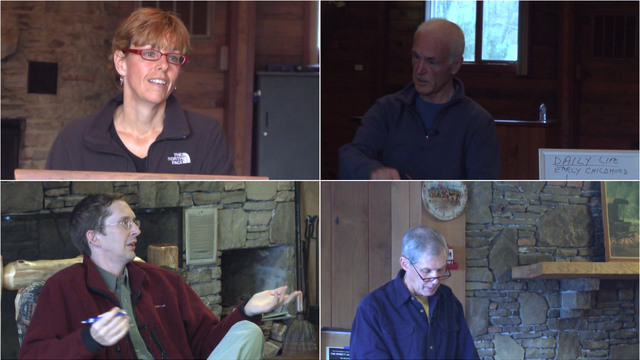
Local Group News

 Update from the Central New Jersey Group:
Update from the Central New Jersey Group:
The Central Jersey Self Inquiry Group has been meeting 2 times per month since our first meeting in early January this year. We have been averaging 5 participants at each meeting. Current outreach is our meetup.com page (above link) and word of mouth. Our most recent meeting topic was: "What is your biggest obstacle?"
~ Email
for more details.

 Update from the Central Ohio Non-Duality Group:
Update from the Central Ohio Non-Duality Group:
The Columbus group operated under the name OSU Self-Inquiry Group and met for many years in a church next to The Ohio State University. After attendance dropped off, the venue was changed to a local Panera restaurant, and the name changed to Central Ohio Non-Duality Group. The group has exposure to seekers through Meetup, but has only occasional visitors outside a core group of 4 people.
Due to schedules, we have met infrequently the past semester, and in deference to an effort to try to do other things, like rapport sittings, in private meetings.
Meeting format is a discussion format on topics of interest to seekers, and often bridges from the concerns, questions and interests of the core members in attendance into the topic which we intend to discuss.
See the rest of the update.
We continue to meet on Monday evenings at Panera across from The Ohio State University.
~ For further information, contact
or
.
We're also on Facebook.

 "Double Take on Life" blog
"Double Take on Life" blog
Two friends—one a TAT member, one a TAT friend; one living in Canada, one across the border in the US; one male, one female—have partnered to create a blog site, which they hope other TAT members and friends will enjoy and respond to.
"We are two friends who were encouraged to continue our spirited and free-wheeling conversation about life with a blog. This bipolar labor of love intends to roam between various forms of expression and perspective, both serious and amused. And traverse between the nitty-gritty of the everyday to the essence of being. As above, so below."

 Update from the email self-inquiry groups:
Update from the email self-inquiry groups:
An update on the women's self-inquiry group from Anima:
The Women's Online Confrontation (WOC) group consists of weekly reports where participants can include:
> What is on your mind?
> Any projects that you want to be held accountable for?
> Responses to a selected excerpt (in the previous report).
> Comments/responses/questions for other participants.
A philosophical/spiritual excerpt with two or three questions is included in each report.
Based on what we share, participants ask questions to help get clarity about our thinking.
The intention is to help each other see our underlying beliefs about who we are.
One rule we try to adhere to is not to give advice or solve problems.
The number of participants, to make it work efficiently, is between 4 and 7 including the leader.
Both the women's and the men's weekly email groups are active and welcome serious participants. ~ Contact or for more information.

 Update from the Gainesville, FL self-inquiry group:
Update from the Gainesville, FL self-inquiry group:
We continue to meet at the Alachua County library on alternate Sundays.
~ Email
or
for more information.
|
The Gainesville self-inquiry group is planning a
four-day intensive retreat at the Claymont Society in Charles Town, WV on Monday-Friday, June 10-14, leading into the June 14-16 TAT gathering.
|

 Update from Galway, Ireland:
Update from Galway, Ireland:
Tess Hughes is currently working with seekers one-to-one and holding occasional group self-inquiry retreats.
Anyone who's interested in self-inquiry activity in Ireland is welcome to
contact
.
TAT Press publishes Tess's easy to read, profound This Above All, the story of her journey of Self-Discovery.

 This is a new listing for the self-inquiry group in Goldsboro, NC:
This is a new listing for the self-inquiry group in Goldsboro, NC:
The Goldsboro Inquiry Group (GIG) meets on the first and third Monday evenings of the month. We begin the meeting with a short reading, then sit in silence for 20 minutes before opening it up to what I like to call group assisted self inquiry.
~ For details on when and where, contact
.
|
|
 Update from the Greensburg, PA self-inquiry group:
Update from the Greensburg, PA self-inquiry group:
The Greensburg Self-Inquiry Group is still in hiatus. I do plan to start it up again at some point as I see it as a lifeline to my own spiritual path. Things got stale with my group's participants, but I will e-mail them at some point to schedule another SIG meeting. In the meantime, I participate in a local "Socrates Cafe" group at the coffeehouse/art gallery where I have had my meetings. This group is not into esoteric philosophy as such, but they're supposed to be into "Socratic Inquiry," and I figure it's better than not engaging in any discussions with people. At least we sometimes touch upon spiritual matters, and this makes attending their meetings worthwhile.
~ Contact
if interested in local self-inquiry meetings.

 A new self-inquiry group is forming in Hartland, VT:
A new self-inquiry group is forming in Hartland, VT:
Located in central Vermont, along I-91, the group will be using TAT videos from past conferences as a primer for discussion.
~ Contact
for more information.
 Update from the Lynchburg, VA self-inquiry group:
Update from the Lynchburg, VA self-inquiry group:
We're currently using Alfred Pulyan's correspondence with Richard Rose as inspiration for our weekly gathering. We're perusing the letters during the week and then coming together to see what got our attention. This activity was inspired by several online groups who have used them in past years with good results. The women's group, run by Anima Pundeer, also inspired us as we already have some questions posed by Anima to go with each letter. It's always good to share additional questions among groups!
We continue to meet at The Drowsy Poet cafe at Little Dickens Bookstore, from 6:30-8:00 every Thursday evening.
~ Email
or
for information on the meetings.

 Update from the New York City self-inquiry group:
Update from the New York City self-inquiry group:
We meet every Monday in New York City's Financial District, where all great spiritual realizations take place ;) Our goal is to investigate and examine our beliefs (definition of examine: from Old French examiner "interrogate, question, torture"). We aim to serve as mirrors for each other, to see ourselves more clearly, in a group dynamic, within a safe environment. Recent topics include critiques of pema chodron, what it would be like to be god, and the consciousness of trees. If you believe something and are interested in doubting it, we are here for you :)
~ We have open meetings for first-timers; so if interested please reach out to
or find out more through our Meetup link above.
 Update from the Pittsburgh, PA self-inquiry group:
Update from the Pittsburgh, PA self-inquiry group:
We meet on the 1st & 3rd Wednesdays of each month, from 7-9 PM, at the Friends Meeting House in Oakland (4836 Ellsworth Ave, PGH 15213) and on the 2nd & 4th Wednesdays, also 7-9 PM, at Panera Bread in Shadyside (5430 Centre Ave, PGH 15232).
Last month's topics were:
May 1: What is the strategy behind your individual approach to "Know Thyself", the ancient prescription to answer all questions?
May 8: We'll investigate what some consider the core of Self-Inquiry, as taught by Nisargadatta: "Discover what you are not."
May 15: The challenge for the seeker is to live a spiritual life in the middle of everyday life - "to be in the world, but not of the world." Mike W. will host.
May 22: "Do You Exist?" and the challenge from Liberation Unleashed, monitored by Mike W.
And on Monday, May 20th, we made a field trip to an Epiphany Academy talk on St. Theresa of Avila.
~ For further information, contact
or
.

 Update from the Portland, OR self-inquiry group:
Update from the Portland, OR self-inquiry group:
We have two kinds of meetings in Portland. One is a small closed group that meets at a local coffee shop. The format for this meeting is to give each person 20 minutes or so to talk about whatever is coming up for them in their practice. The other is an open meeting, held at a local library, that is advertised through Meetup. These meetings usually have a topic with questions, and the format is to give each person approximately 10 minutes to comment on the topic and then to answer questions from others. We haven't been holding open meetings regularly but hope to get them back on track for the new year.
~ Email
for more information.
 Update from the Raleigh, NC Triangle Inquiry Group:
Update from the Raleigh, NC Triangle Inquiry Group:
The Triangle Inquiry Group (TIG) meets on Wednesday evenings near NCSU. The inquiry process that we practice is essentially subtractive in nature, identifying 'what I am not', while exposing our false certainties and limiting beliefs; thus we are revealing the underlying truth of Who We Really Are. By asking honest, open, respectful questions that invite reflection, insight and the deepening of one's inner knowing, and by simply being present with our attention and sincerity, we create a space for direct seeing into true nature.
~ See the website for more information.
|
|
 Update from the San Francisco Bay area self-inquiry group:
Update from the San Francisco Bay area self-inquiry group:
See the Shawn Nevins interview by Iain McNay of Conscious.tv, kicking off the publication of Shawn's book Subtraction: The Simple Math of Enlightenment.
~ Email
for information about upcoming meetings and events.
 Update from the Sarasota, FL self-inquiry group:
Update from the Sarasota, FL self-inquiry group:
Meetings are on alternate Wednesdays.
~ Email
for more information.
Members-Only Area
A password-protected section of the website is available for TAT members. The area contains information on product discounts for members as well as a substantial amount of helpful and historical information, including audio recordings, Newsletter archives, Retrospect archives, policies, conference proceedings, business meeting notes, photographs, and suggestions for ways to help.
 TAT's April 2019 Spiritual Retreat Weekend was titled Once in a Lifetime is Now. The following audio recordings are
TAT's April 2019 Spiritual Retreat Weekend was titled Once in a Lifetime is Now. The following audio recordings are 

 TAT's August 2018 Workshop was titled Beyond Imagination and included three guest speakers who each led separate workshops. The following audio recordings are now available in the members-only website area:
TAT's August 2018 Workshop was titled Beyond Imagination and included three guest speakers who each led separate workshops. The following audio recordings are now available in the members-only website area:
- "Nurturing What We Are" with Jenny Clarke,
- "The Art of Seeing" with Norio Kushi, and
- "Seeing Through Imaginary Traps" with Shawn Pethel.


 TAT's June 2018 Gathering was titled In Search of Happiness. The following audio recordings are now available in the members-only website area:
TAT's June 2018 Gathering was titled In Search of Happiness. The following audio recordings are now available in the members-only website area:
- "Four Views of Happiness: Three steps beyond the search" by Avery Solomon,
- "How You Can Be 'Free of Happiness'" by Gary Weber,
- "A Personal Perspective on Friendship: Ode to 'Mrs. C.'" by Larry Inderbitzin, and
- "Seeker Stories and Q&A" by Michael W., Penny W., and Michael R.



 TAT's April 2018 Gathering was titled Steps on the Path. The following audio recordings are now available in the members-only website area:
TAT's April 2018 Gathering was titled Steps on the Path. The following audio recordings are now available in the members-only website area:
- "Rose's Jacob's Ladder: Steps on the Path" by Bob Fergeson,
- "The Threefold Path" by Paul Constant,
- "What Keeps Us from Being Awake?" by Paul Rezendes,
- "Allowing Exploration" by Shawn Nevins, and
- "What's Trying to Get Your Attention?" by Mark Seabright.
Please us if you have questions. (Look here for info on TAT membership.)
Amazon and eBay
|
As an Amazon Associate TAT earns from qualifying purchases made through links on our website. TAT has registered with the eBay Giving Works program. You can list an item there and select TAT to receive a portion of your sale. Or if you use the link and donate 100% of the proceeds to TAT, you won't pay any seller fees when an item sells and eBay will transfer all the funds to TAT for you. Check out our Giving Works page on eBay. Click on the "For sellers" link on the left side of that page for details. |
Your Contributions to TAT News
TAT founder Richard Rose believed that working with others accelerates our retreat from untruth. He also felt that such efforts were most effective when applied with discernment, meaning working with others on the rungs of the ladder closest to our own. The TAT News section is for TAT members to communicate about work they've been doing with or for other members and friends. Please your "ladder work" news.

Humor
"One thing you must be able to do in the midst
of any experience is laugh. And experience
should show you that it isn't real, that it's a
movie. Life doesn't take you seriously, so why
take it seriously." ~ Richard Rose, Carillon
|
Thanks to Izismile.com.
|
|
"Rumpole of the Bailey" was Douglas Harding's favorite TV series. There's an episode where Rumpole's son had been in the courtroom and accused him of not being very dignified (i.e., he was defending a client the son thought clearly guilty). Rumpole's response: "You can't be born or die in a dignified position! Now how the hell can you live in one, my old darling?" An interviewer asked John Mortimer, the barrister who created the Rumpole stories, why he thought life was best served up as a comedy. Mortimer's response: "Because I think life is comic … we're poised between two great voids, and we have a little, very short time, and we give ourselves such huge importance … imagine that we're superhumanly important, and really we're specks of dust that are going to fly out the window…."
Democracy – "The substitution of election by the incompetent many for the appointment of the corrupt few." ~ George Bernard Shaw
"I'm a mog - half man, half dog. I'm my own best friend." ~ Barf (John Candy) in Spaceballs
"The secret of life is honesty and fair dealing. If you can fake that, you've got it made." ~ Groucho Marks
|


~ Pino More © Mike Payne.

 We're hoping to present more humor from TAT members and friends here. Please
your written or graphic creations. Exact sources are necessary for other submissions, since we need to make sure they're either in the public domain or that we have permission to use them.
We're hoping to present more humor from TAT members and friends here. Please
your written or graphic creations. Exact sources are necessary for other submissions, since we need to make sure they're either in the public domain or that we have permission to use them.

Inspiration & Irritation
Irritation moves us; inspiration provides a direction
|
Insights
I don't wait for moods. You accomplish nothing if you do that. Your mind must know it has got to get down to work. ~ Pearl S. Buck
Courage is being scared to death—and saddling up anyway. ~ John Wayne
Opportunity knocks only once, but temptation leans on the doorbell. ~ Western Livestock Journal
Discipline is remembering what you want. ~ David Campbell
Most people want to be delivered from temptation but would like to keep in touch. ~Robert Orben
~ From Everyday Greatness: Inspiration for a Meaningful Life by Stephen R. Covey |

|
Richard Rose used to demonstrate putting people to sleep using different induction techniques, from talking, to pointing, to Mesmeric passes. He thought that learning to hypnotize was a good way to study the mind. He recommended reading The Law of Suggestion by Santanelli in order to learn an induction technique. * ~ Thanks to TAT member Mark W. |

|
Charles Darwin used to say that whenever he ran into something that contradicted a conclusion he cherished, he was obliged to write the new finding down within 30 minutes. Otherwise his mind would work to reject the discordant information, much as the body rejects transplants. Man's natural inclination is to cling to his beliefs, particularly if they are reinforced by recent experience…. ~ Warren Buffett, Dec. 10, 2001 Fortune magazine
The purpose of life is to be loved by as many people as possible among those you want to have love you. ~ Warren Buffett to students at Georgia Tech
One of my favorite things to do is to hike in the mountains, which have long been a source of inspiration to mankind. While visiting Oslo, Norway, in 2006, I sought out a ninety-year-old philosopher named Arne Naess, a colorful character who lived part of the year in a shack nestled in the mountains. At age twenty-seven, he had become the youngest professor at the University of Oslo and there coined the term "deep ecology" to express the idea that human beings are intimately and spiritually connected to the earth. Though he was affected by dementia, Arne was still a fount of wisdom when we met. As we sat in a restaurant overlooking Oslo, he emphasized a truism that he lived by: "Think like a mountain." ~ Peter J. Whitehouse, M.D., Ph.D., The Myth of Alzheimer's: What You Aren't Being Told About Today's Most Dreaded Diagnosis
Lo! I am with you always, means when you look for God, |

Please
your thoughts on the above items.

Reader Commentary
Encouraging interactive readership among TAT members and friends
|
A reader wrote that what would make the Forum more interesting would be: Hearing from people who are searching – and have questions instead of those providing endless advice and "answers." What challenges they are facing. What their doubts and questions are. How they perceive their path is going. What they are doing in their lives. Where they think they will end up. Etc. etc. Can you help make the Forum more interesting? |
 The Readers Commentary question for this month took a different approach: We put together an online survey, a brief questionnaire to compile strengths of beliefs that our readers have about what they are. The focus is on feeling-level beliefs—which we may have absorbed in early childhood, in early school years, in other life transitions, and in various traumas. They may influence the weightings given to the various fears and desires in our decision-making process, and we may or may not be conscious of them. Our life experience may challenge them, and if we're pursuing an intentional path of self-realization, we may be interested in trying to accelerate the process in our self-inquiry practice.
The Readers Commentary question for this month took a different approach: We put together an online survey, a brief questionnaire to compile strengths of beliefs that our readers have about what they are. The focus is on feeling-level beliefs—which we may have absorbed in early childhood, in early school years, in other life transitions, and in various traumas. They may influence the weightings given to the various fears and desires in our decision-making process, and we may or may not be conscious of them. Our life experience may challenge them, and if we're pursuing an intentional path of self-realization, we may be interested in trying to accelerate the process in our self-inquiry practice.
Feeling-level beliefs are different from sophisticated beliefs that may have developed from reading or listening to philosophical, scientific, or spiritual authorities. They're more the beliefs of the inner child and may be much stickier in the retreat from untruth about what we are.
We seeded the anonymous survey with some beliefs that have come from self-inquiry discussions. We asked TAT Forum readers to rate how strongly they align with those beliefs on a scale of 0 (not a belief) to 10 (very strongly believed). And we included the ability to add any other strongly-held beliefs with their associated strength ratings.
A summary of the results follows:
 Thirty-one readers participated. The average strength of their individual beliefs in the nine stated beliefs ranged from 0 for three respondents (although two of the responses were made within 15 minutes, indicating a possible duplication) to 9 for two respondents. The average strength across all responses was 5.
Thirty-one readers participated. The average strength of their individual beliefs in the nine stated beliefs ranged from 0 for three respondents (although two of the responses were made within 15 minutes, indicating a possible duplication) to 9 for two respondents. The average strength across all responses was 5.
 The nine beliefs in descending order of the respondents' average strength of belief were:
The nine beliefs in descending order of the respondents' average strength of belief were:
- Lacking in some way (6.9 of 10)
- A separate awareness (6.5)
- An individual body/mind (6.4)
- Something that was born as is going to die (6.0)
- Something vulnerable, affected by what I experience (5.9)
- Responsible for my actions (5.3)
- The thinker (4.6)
- The decider (4.2)
- The source of my wants and values (3.3)
 Other strongly-held beliefs written in by respondents were:
Other strongly-held beliefs written in by respondents were:
- I am not a person in the world. The world is in me.
- A temporary being who will cease to exist when I die.
- I believe I am that which is witnessing.
- There is guidance; there is protection; there is grace; however I am expendable.
- Something is wrong with me. I am worthless.
- My ultimate destiny is unity.
- My beliefs started at an early age and carried through many surroundings—Christian churches, A Course in Miracles, yoga, SIG, two years of seminary, Science of Spiritually, inspirations from many people and events, and more. Then recently in my eighties, it became to me obvious (some might say revealed) that beliefs are not reality. It seems that many beliefs have developed from the idea of some sort of god. Some might say that non-belief is just a belief. Some beliefs work well in our society and in the music of our society. Familiar belief songs bring peace and happiness. Asking forgiveness of some supposed god or power may bring peace as well as help the inner self. There is only NOW, no past and no future. It seems so obvious. Good and bad don't exist. If one thinks something is good or bad, then that one can change it if she/he can. And if not, just see it as perfect. This existence is perfect. Beliefs can help enrich one's life even if they are only beliefs.
Seeing perfection helps make the world beautiful. On my way to Sunday morning coffee, going north on Ridge Road, new house construction is happening—such perfection in this activity. Cars moving like ants in and around each is beautiful to behold. Street signs, people signs, overhead wires, poles that are leaning, dog shit and an empty coffee cup on the street. All are part of the world I see. Then in Whole Foods, I look across the store and see the many signs hanging. The composite has its beauty. This may sound really wonderful, but sometimes life can change quickly and one has to hang on to this real[ity] as much as possible. - I need to be fixed (9). We're victims (10). I believe I react much more strongly to my fears than my desires (10).
- Feel responsible.
- I am alone in the universe, abandoned by any creator I may have.
|
The strongest belief held by the respondents to last month's survey was "Lacking in some way." It was elaborated on by one respondent as "Something is wrong with me. I am worthless," and by another as "I need to be fixed." The composite question for next month is: Do you feel that there's something wrong with you? If so, do you feel that you need to be fixed? What do you think it would take to fix what's wrong with you? Please your responses by the 25th of June and indicate your preferred identification (the default is your first name and the initial letter of your last name). |
 Other Reader Feedback
Other Reader Feedback
 From Patrick K.:
From Patrick K.:
[Referencing the Peter Fenwick interview "What really happens when you Die" in the May 2019 TAT Forum:]
Q: What's your feeling about mind/awareness and the brain: that awareness is a product of the brain or that awareness transcends the brain?
From looking at different cases of near death experiences and their accounts of transcending the body and having freedom to get about, among other features, all I can say is … I tend to feel that there is a consciousness, an organism that is sensing its experience. Awareness has a much subtler presence. So consciousness is more an aliveness or liveliness wheras awareness is more of a silence behind that. Consciousness is of the brain, I think, and awareness encapsules that but yet is free of the brain. I think the key is to somehow align your bodily consciousness with that awareness to somehow become one with it, but that's mere speculation on my part.
[Referencing the "Afflictions to the Sense of Self" quote from Restoration Heights by Wil Medearis in the May 2019 TAT Forum:]
Q: When our pride is stung by an offense or embarrassment, are we seeing things as they are or how we think they are?
Pride has an emotional feeling. It puffs me up instinctively. So it will not be an accurate reaction; all reactions are relative. For me the most accurate seeing occurs in retrospect. Survival instinct will always look to protect itself, fight for its life, and will not accept any slights.
The problem with taking offense and embarrassment is that if I identify to some degree with the negative thing that was said or done to me. Like if something negative happens, and I say I deserve it, or if someone slights me but I feel somehow identified with the negative comment.
But the more I transcend my character in the play, my fears and desires, the story of the small "s" self, the embarrassments become less invasive. They begin to have nowhere to land or stick.
[Also referencing the "Afflictions to the Sense of Self" quote in the May 2019 TAT Forum:]
Q: What are the underlying beliefs about ourselves that can be threatened by experience because they're questionable?
Well, vulnerability is one anyway. Although the body is vulnerable in terms of being run over by a bus, I'm not vulnerable in terms of verbal abuse, confrontation, or having my fears challenged. The coward in me may shy away from such confrontation, but nothing is taken or given in the exercise. I like to paraphrase a saying Tess Hughes said once, "Anything that's afraid in me is unreal and is afraid of its own death and must die; the Real in me is not afraid and is eternal". Now I struggle with the eternal aspect of the saying, but I take the first part seriously and am beginning to challenge those parts in me that are afraid.
 From Brett S. [in response to the "Afflictions to the Sense of Self" quote from Restoration Heights by Wil Medearis in the May 2019 TAT Forum]:
From Brett S. [in response to the "Afflictions to the Sense of Self" quote from Restoration Heights by Wil Medearis in the May 2019 TAT Forum]:
Q: When our pride is stung by an offense or embarrassment, are we seeing things as they are or how we think they are?
Stung pride and embarrassment can happen when I see things as they are and "how they are" is different from how I believed them to be. For example, if I think of myself as being financially generous and I'm in a social situation where it's pointed out that I am being a miser, that will sting my pride and cause me embarrassment. So it's when a thought that I am "a certain way" (e.g. generous) gets contradicted that embarrassment arises, which may be an expression of cognitive dissonance. It's realizing that there is a hole in my plot line.
Perhaps at a fundamental level, I am neither one thing (generous) nor the other (not generous). Certain aspects of my personality can show up at times, but it's not who I am, I believe. So seeing things as they are might be to reject any tendency to invest fundamental, permanent importance to any belief I have about myself.
I can think of examples from my own life that relate directly to the quote. Before I moved to New York City and before I practiced self-inquiry, I would look at a person on the street, make up a story about them, and mostly believe it. What their personality was like, their tastes, hobbies, all sorts of things. The details, I'm sure, were vague but that didn't stop me from thinking I knew something about the stranger I was looking at. Riding the subway in NYC though, I would hear their conversations and realize just how off base I was. Hearing people's voices immediately changed my impressions of them.
Q: What are the underlying beliefs about ourselves that can be threatened by experience because they're questionable?
Here are a few: that thoughts are to be believed. That there is a stable, reliable, dependable "self" that shows up everyday with consistent and identifiable qualities. That feelings accurately reflect reality. That I am vulnerable. That I am "like this" and not "like that" (using any value or personality trait for this and that). That I beliefs create experience (with experience including both thoughts/feelings and events). That I can direct, influence, or control things. That I know what the rest of my life will be like. That I know what is good (pleasant or helpful) and bad (painful and unnecessary). That there is me (a singular essence that has been around as long as my birth certificate says and that can thrive or be hurt, with thoughts and feelings as the metrics for determining whether thriving or pain are happening).

 Richard Rose described a spiritual path as living one's life
aimed at finding the meaning of that life.
Did you find anything relevant to your life or search in this month's TAT Forum?
Richard Rose described a spiritual path as living one's life
aimed at finding the meaning of that life.
Did you find anything relevant to your life or search in this month's TAT Forum?
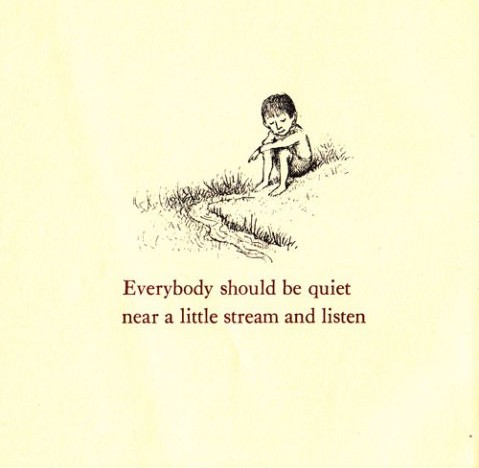
~ Illustration by Maurice Sendak for Ruth Krauss's
Open House for Butterflies. Thanks to Brain Pickings.org.

We like hearing from you! Please
your comments, suggestions, inquiries, and submissions.
 Sign up for notices of TAT's four annual events and free
monthly Forums by email on our .
Sign up for notices of TAT's four annual events and free
monthly Forums by email on our .

Founder's Wisdom
Richard Rose (1917-2005) established the TAT Foundation
in 1973 to encourage people to work together on what
he considered to be the "grand project" of spiritual work.
Six Forms of Perception
From Psychology of the Observer
I would like to list six different forms of perceiving:
1. Normal Sensory Perception. This is ordinary seeing or perceiving. As the result of a sensory stimulus, the mind coordinates the stimulus with previous stimuli, and projects back upon the physical environment, that which it wants to see. Only this projection is seen by the individual's awareness. To say the same thing more precisely, man visualizes everything that he perceives (thinks he perceives) through the physical senses. It is a "normal" percept followed by a "normal" projection.
2. Abnormal Sensory Perception. This is illusory or non-validated phenomena. These are visions which apparently are seen by the eyes (or percepts connected with the other senses) which later will be found to be invalid or illusory in nature. Included in this category are ghosts that cannot be checked out, hallucinations, holograms, mirages, and hypnotic phenomena that involve the imposition of illusions on the mind of the subject.
The next four categories have to do with Mental Perception. A while back I discussed the ability of the mind to see or perceive. The examples given showed clearly that such perceiving resulted from initial sensory stimuli. There are, however, instances where the mind "sees" independently of the senses. I call this ability Visualization-projection not warranted by percepts.
3. Mental Visions. Here the mind watches synthetic projections from its memory bank (we conjure up an apple with diamonds imbedded in the sides). This is memory revisited and rearranged. This is commonly called imagination.
4. Visions Without Projection by the Perceiver. Nonphysical visions, valid according to some means of corroboration, or laws of reference. Their general corroboration lies in the fact that they often are found later to have been revelations of some sort. They are ghosts that substantiate their presence by warnings or prophecies. They are dreams, articulate voices from non-visible sources, and instances of déjà vu which are found to be more than a hallucination. It may be that some of these visions are contacts with the Manifested Mind, or with emanations from the Manifested Mind.
Also in this category are direct-mind communications which we pick up accurately from another person, such as in mind-reading. In the past many phenomena which we now describe under the heading of ESP or Psi phenomena, were previously described for the recipient as being an ability called the sixth sense.
This sense can be discovered and developed. It amounts to a sort of sensitive feeler which the mind extends to the mind of another, using in the beginning all manner of clues from the countenance of the other person and even items of posture and tone of voice, to guess (at first) that which the other person may be thinking. But after a while, success will breed accuracy, and later still, we will be able to possess a feeling of knowing instead of uncertainty. This feeling of knowing results from persistent checking over a long period of time with the person that we are reading. Group sessions for the purpose of attempting to have rapport and picking up information are good.
5. Visions of Mental Processes without Sensory Percepts. This is not the same as the third category which is reverie or imagination. This is that which we shall later call the Process Observer. This is the mind which is anterior to the Umpire and its phenomena. It is a part of us that sees. It sees the mind, the somatic or Umpire mind. It is, in turn unable to watch itself, or any processes peculiar to itself. This is a genuine mental awareness by the Real Self, or Ultimate Self.
6. Deliberate Mental Projections. This last category of visions is that which is caused by someone's mind (projection by them), which has an impact upon other minds, to a point where the recipient may have the conviction that he physically sees the projections.
These are visions projected upon the world scene, or upon our consciousness by another. Under this heading we have tulpas (Tibetan materialized humanoids) and the Indian rope trick. Other instances are cases of bilocation, healing at a distance, psychokinesis, transubstantiation (water into wine, etc.), and possession. I would like to devote an entire book to this subject, and to the methods of attaining expertise in this type of projection. These are manipulations which are unreal even to the laws of the relative plane, or are illusions which are projected into our mind and which we then visualize or project upon the world-view.
There is a dynamism here, in this category, which makes man into a momentary creator, with limits he never dreamed were possible. There is a mark of the sensational and the miraculous here, truly, for man with his relative and deluded mind, to be able to train itself to create within the microcosm a change or variation which may be contrary to the strict beliefs of mankind about the scientific limitations of the physical world, and contrary to the knowledge that those massive beliefs actually may be the formative substance of this physical world which one individual may be able to affect.
Also included in this category is the phenomenon known in esoteric philosophy as transmission…the direct conveyance of a deep spiritual realization.

Homing Ground Update… A spot on earth where people can do retreats and hold
|


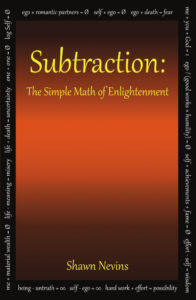 TAT Press's release of Shawn Nevins's new book,
TAT Press's release of Shawn Nevins's new book, 
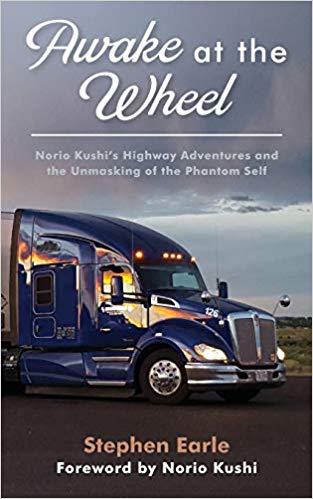
 Update from the Google Hangouts self-inquiry group:
Update from the Google Hangouts self-inquiry group: Update from the
Update from the 
